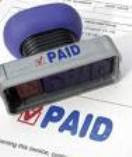This challenging time can prove to be very trying for your business. Turn-around times are slow and nobody is eager to pay. Due to the recent economic downturn, customers are asking for extra extended terms of payment, which additionally constrains your cash flow.
The ever present need to cover your expenses makes you struggling just to make ends meet and you are concerned about your ability to resolve financial obligations. Ever heard or think about selling your companies invoices? It might seem ridiculous idea, but it is possible and is called factoring receivable. Many business owners that sell on credit terms just don’t realize having a hidden asset that can be used to obtain cash on-the-spot. It is as simple as a line of credit based on invoices of your company. Account receivables, i.e. your invoices are sold to factor company and you don’t have to wait for your customers to pay them. The basic benefit of factoring receivable is providing your business with expedient cash flow, and it is based on your current invoice assets. When your business is in a need of efficient cash flow alternative this might be appropriate financial strategy. Now, don’t just jump in blindly. Before taking any decisions you better ask if you are suitable candidate for this method. Getting a general understanding of how factoring companies earn their money is crucial for the future of your business.
 Factoring receivable companies do not lend money, but they literally purchase your account receivables, i.e. invoices at discounted price. The difference between the face value of sold invoices and the discounted price you get is fee and is charged by factors to cover expenses for their service. No matter how desperately you are in a need of cash, fee must be deciding during your considerations whether to take factoring receivable agreement or not. Just the thorough calculation where the expenses are subtracted from income can determine your company's net profit. Only fees that are not menacing to your profit margins can be acceptable and good for the growth of your business. Of course advanced cash from your factor may substantially help to your purchasing power. It is true, expanded business results in higher profit margins for fixed costs are not increasing with larger volume of your business. But don’t try to cheat yourself; if your company is not growing and profitable, then factoring does you no good. Only when improved cash flow allows you become more profitable, factoring receivable is the right thing for you.
Factoring receivable companies do not lend money, but they literally purchase your account receivables, i.e. invoices at discounted price. The difference between the face value of sold invoices and the discounted price you get is fee and is charged by factors to cover expenses for their service. No matter how desperately you are in a need of cash, fee must be deciding during your considerations whether to take factoring receivable agreement or not. Just the thorough calculation where the expenses are subtracted from income can determine your company's net profit. Only fees that are not menacing to your profit margins can be acceptable and good for the growth of your business. Of course advanced cash from your factor may substantially help to your purchasing power. It is true, expanded business results in higher profit margins for fixed costs are not increasing with larger volume of your business. But don’t try to cheat yourself; if your company is not growing and profitable, then factoring does you no good. Only when improved cash flow allows you become more profitable, factoring receivable is the right thing for you.Check the offering factor companies profoundly and take in consideration the risk of negatively influencing your customer relationship. Looking long-term, you can not afford your customers to be harassed for money. Factors with highest reputation are specialized in collections of your funds in a strictly professional manner, providing your long established business relationships to remain unaffected.They are serving you as your account receivables department, fully managing your sales ledger and all processes related to your invoices. Unloaded of the burden of follows-up on late invoices, monitoring procedure of collection and annoying confrontations with late-payers you may finally be able to concentrate on your business and other matters strictly connected with the growth and expansion of your company.

























